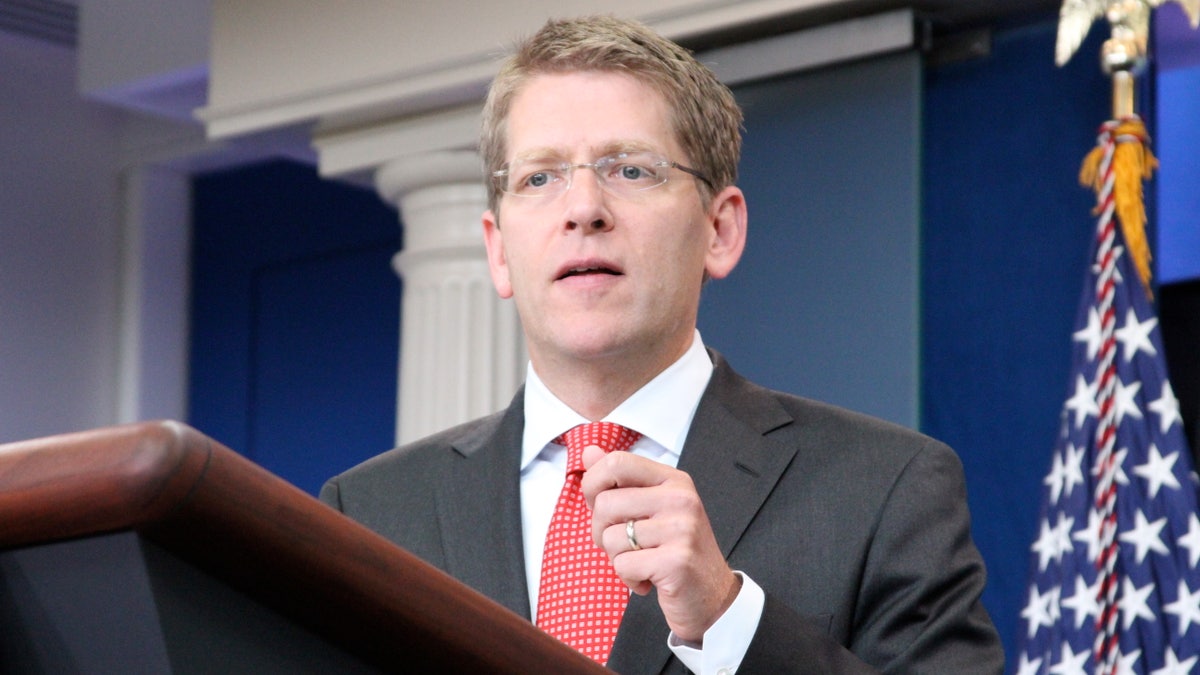
White House Press Secretary Jay Carney speaks at his daily news briefing at the White House July 20. (Fox News)
Democrats and Republicans are nearing a potential debt deal that would include $3 trillion in deficit reduction over the next decade, sources said Thursday, though the White House and House Speaker John Boehner emphatically denied that they were close to an agreement.
A congressional aide told Fox News that the package would not include revenue increases. A source outside Congress who is advising negotiators confirmed this, adding that the possible plan would include a "promise of fundamental tax reform" to lower individual rates and simplify the tax code.
Talk of a possible deal to raise the debt ceiling on those terms already has shaken Senate Democrats. Senate Majority Leader Harry Reid said an agreement can't be composed only of spending cuts and would need to include some revenue for the sake of "balance."
He said that while he's told there is no agreement, negotiators are working toward one.
White House Press Secretary Jay Carney tried to muffle chatter about the talks at the press briefing Thursday.
"There is no deal. We are not close to a deal," Carney said. He shot down a report in The New York Times that first claimed a major deal was in the works.
Boehner likewise labeled the report "false" on his Twitter page.
Despite the conflicting claims, Carney tried to project confidence. He said Congress will raise the debt ceiling and claimed the only matter in question is what kind of deficit reduction package could be attached to that vote. Pressed on how the Obama administration could be so certain the debt ceiling will be raised before an Aug. 2 deadline with no deal in hand, Carney said that just because lawmakers haven't been able to strike a deal yet "doesn't mean that there won't be one."
"Obviously there won't be a deal until there is a deal," he said.
The unclear statements underscore how many moving and conflicting parts there are in the debt cap negotiations. Carney said Wednesday there are "multiple trains heading toward the station" and lawmakers just have to figure out which one to ride.
While backroom talks continue, the Senate is expected Friday to formally reject the House Republicans' "cut, cap and balance" plan. That plan would cut and cap federal spending and require Congress to approve a balanced-budget amendment in exchange for a debt-ceiling increase. The bill already passed the House, but Democrats are vowing to defeat it in the Senate.
As a more palatable alternative, the White House has also been talking up the bipartisan "Gang of Six" proposal to cut deficits by $3.7 trillion over the next decade and raise the debt ceiling.
Lawmakers on both sides of the aisle have expressed a willingness to look at it, but not everyone is sold and the White House acknowledged Wednesday that the proposal doesn't even exist in bill form.
It's unclear whether that plan is the basis for the latest talks.
All the while, senators are working on a fallback plan to allow Obama to seek a series of debt-ceiling increases, crafted in such a way that would require a two-thirds majority in Congress to stop him. It would also come with a smaller package of spending cuts and call for the creation of a new deficit-reduction commission.
But conservative lawmakers dislike that approach and are pledging to oppose it.
With the clock ticking, the White House has opened the door to giving Congress a bit more time to seal and pass an agreement.
Carney said that given the constraints, the president would be willing to support a "very short-term extension" if a broader deal is reached by the deadline and lawmakers just need more time to work out the details. Carney reiterated that Obama's opposition stands to "a toll booth kind of series of provisions that temporarily or in a limited fashion raise the debt ceiling." But he said the president would make an "exception" if a deal is reached "to allow a bit of extra time for a bill to work its way through the legislative process."
Meanwhile, the White House endured some mocking from the GOP for opening the door to a short-term deal. After Obama scolded House Majority Leader Eric Cantor last week and told him not to "call my bluff" on a short-term deal, Cantor's office sent out an email Wednesday titled: "Bluff Called?"




